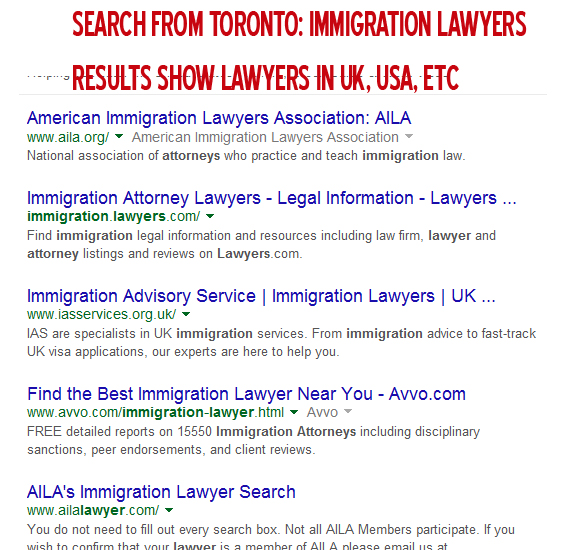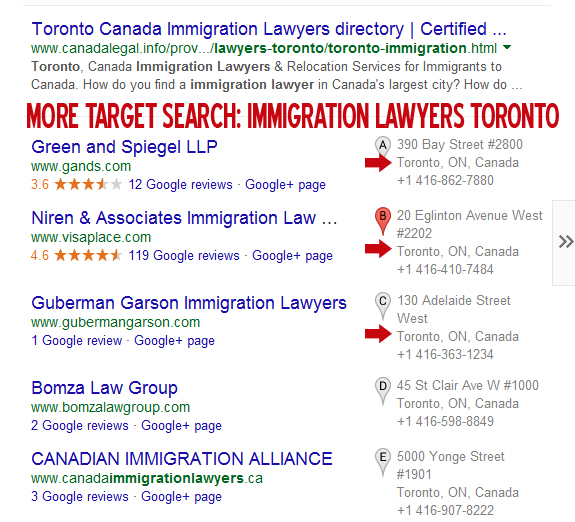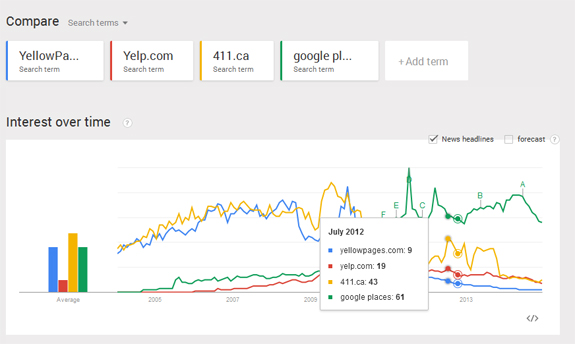It’s no secret businesses are taking to the Internet to start promoting their products and services. Search engines have made it very easy for people searching online to find businesses located near them by tweaking the search algorithm. It’s very easy for Google to determine when a localized search is being performed. For example, certain elements will trigger a localized search like keywords, your IP address, and search engine you use. There are a few strategies that businesses can use to target people within a specific region. This is highly useful to those that don’t sell products online and have a store location nearby. What can you, as a business owner, do to rank higher than your competitors for the keyword “party supplies Torontoâ€? In this example, there is no online store and you would like people to find your store location when they perform a search within Google.
Over the years, I’ve been able to experiment with localized search. I’ve worked with local businesses, helping them rank in search engines for specific keywords.
Here are a few lessons I’ve learned along the way and mistakes businesses should avoid going forward.
Keyword Rich Website
One of the biggest mistakes I’ve seen businesses make is not using the right keyword combination when setting up their website. There is a huge different between “immigration lawyers†and “immigration lawyer Torontoâ€. If your location preferences have not been enabled in your browser, then both of those keyword phrases will return complete different results. For example, “immigration lawyers†will generate results from all over the world and ranking order will depend in factors that Google uses on their own. The problem is with such a broad phrase like “immigration lawyersâ€, it’s hard to determine exactly where you are looking for these services.

Next,
When searching using “immigration lawyer Torontoâ€, you have given a more precise location, “Torontoâ€, so search engines will generate results either containing the keywords immigration + lawyer + Toronto, or will base it on their location mechanism. Using a precise location search will yield the same results even when location tracking has been disabled within browsers. If you do a quick search online on how to disable location in browsers, you’ll be able to find a few tutorials. I recommend leaving it enabled so your search is more organized and precise.
It’s important to ensure your pages are set up correctly so your website appears within the SERP’s for the right keywords. This is not tough as it requires choosing targeted keywords and embedding them within your Meta Title, Meta Description, and within your content. For example, here’s a search result for the keyword “immigration lawyer Torontoâ€

You’ll notice the keywords are precise and targeted so when people need a lawyer in Toronto, Google knows this website is a potential candidate through the keywords used.
Local Business Directories
Business owners continue to neglect the use of local business directories like Google Places, Yelp.com, YellowPages.com, and 411.ca. These are all websites that give people a portal to search for businesses quickly and are great for business owners. Even though there has been a decline in people using business directories as a result of the recent improvements in search algorithms, they continue to be a vital source for marketing. Check out this graph from Google Trends…

It’s free to list your business within these local directories and for more exposure, you can pay extra for a featured listing. Obviously, you should perform some trial and error to determine what directory provides the best conversions. However, because they are free to list, I would use all of the popular ones. Because 80%-90% of searches are performed in Google, I would ensure my business is verified in Google + Business.
If you don’t have a Google + Business account, you can set one up for free. Head over to www.google.com/business/ to get started. Once you have an account, you fill in your business information like profile, photos, phone number, hours of operation, and website. Once you’ve completed the setup, you will be asked to verify through phone number or some other alternative method. Once your business is verified in Google+, you’ll be ready to start showing up in Google Maps.
The reason I have put so much emphasis on setting up a Google+ Business profile is because since Google controls a majority of the searches throughout the web, it’s easy to assume they will give a boost to those listed in their directory within the SERP’s. Either way, if they haven’t started doing it now, then as they become more precise over the next couple of years, we are sure we’ll be seeing something clever from Google + Business.
Build Local Citations, and Ensure Consistency
Here’s another great strategy to add juice to your business exposure within search engines; make use of citations as they provide you leverage over your competition. Here’s a quick definition of citations within Moz.com:
“Citations are defined as mentions of your business name and address on other webpages—even if there is no link to your website. An example of a citation might be an online yellow pages directory where your business is listed, but not linked to. Citations can also be found on local chamber of commerce pages, or on a local business association page that includes your business information, even if they are not linking at all to your website.â€
The key is to get mentions from authoritative places so it helps boost your visibility within the SERP’s and Google maps. Having citations in place are equivalent to having high authority bloggers mention your content or website to their followers. It adds credibility to your website, which is important when trying to gain exposure.
Here are “4†worth checking:
- Moz Local (formerly GetListed.org)
- Whitespark’s local citation finder
- Yext.com
- BrightLocal.com
General SEO
No matter what people tell you about gaining local business exposure, it’s always important to do SEO. Google’s entire search engine is built on authority link building so I don’t think they’ll be replacing it any time soon. It’s important to build links to your website and even listing using general backlinking, however, keeping the fundamentals in mind. For example, use “targeted†keywords that describe your business and locality. Instead of using “immigration lawyersâ€, make your keyword more targeted using “immigration lawyer Torontoâ€. Make sure you have the correct keywords when doing on-page SEO and add them within your content. Obviously, content will only apply to those websites that have a blog element in place.
Here are some general formatting rules to follow when performing On-Page SEO:
- Meta Title and Description
- Content Rich Keywords
- Proper URL Structure
- Text Formatting (H1, H2, Bold, italic and Underline)
- Keyword Density of 2%-4%
- Use EXACT, LSI, and Long Tail keywords.
